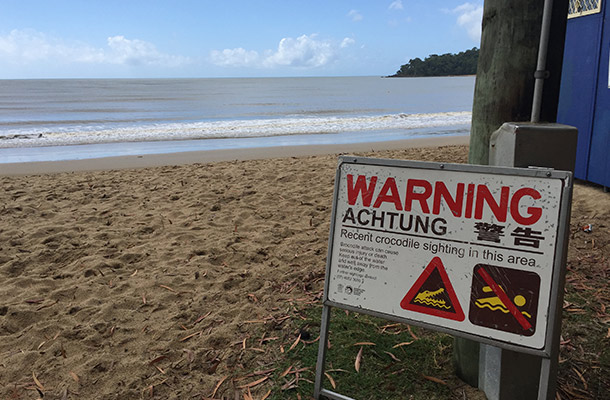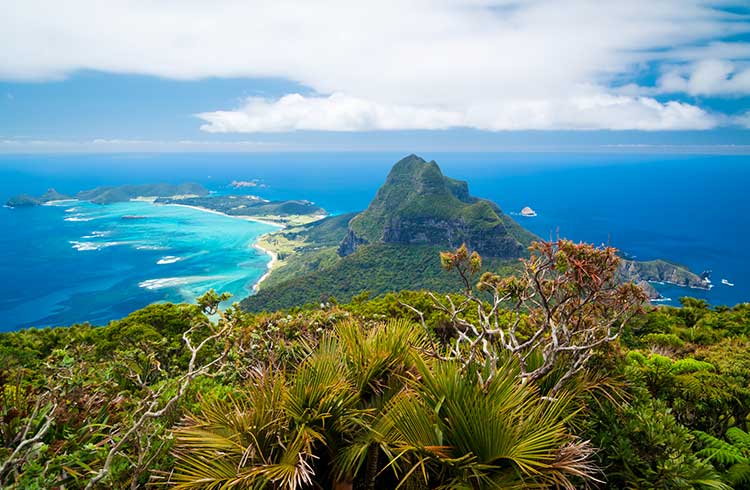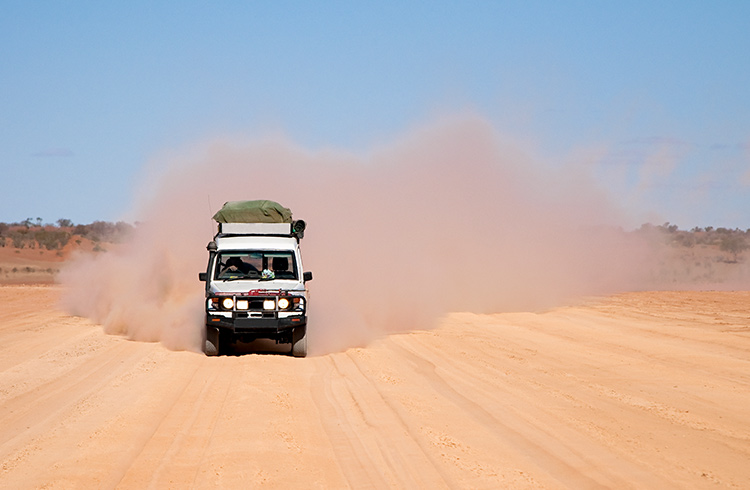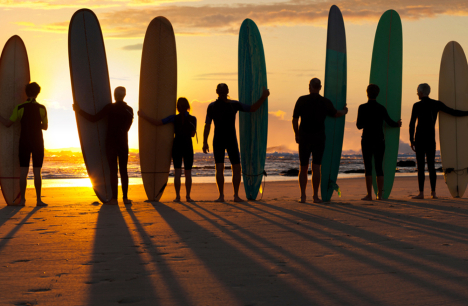Deadly Down Under: How Dangerous is Australian Wildlife?
Australia is home to crocs, spiders, sharks, jellyfish and snakes, But how much danger will you be in if you visit the land Down Under?
 Photo © Milly Brady/wheresmildo.com
Photo © Milly Brady/wheresmildo.com
- How dangerous is wildlife in Australia?
- Spiders in Australia
- Snakes in Australia
- Sharks, jellyfish and crocodiles in Australia
One of the greatest myths about Australia is that it is home to a lot of wildlife that can kill you. Technically, that’s correct but the likelihood of it happening is very low. Here’s our guide to the reality and how to minimize risks.
As well as its incredible beaches and wilderness areas, Australia is well-known for its unique wildlife – koalas and kangaroos, anyone? It’s a popular destination as a result, but, for some, its natural wonders can also be off-putting, too. Australia has a host of deadly animals thanks to its unique biodiversity, but the reality is there is very little to fear – and the stats prove it.
So trust us when we say there is absolutely no need to have reservations about a trip to Oz due to its animal inhabitants. I lived there for nearly two decades and can count on one hand the number of times I saw a big spider (and the harmless kind, too). If you’re in a city such as Sydney, for example, the most ick thing you might see is a couple of cockroaches scurrying around the streets at night. But that’s it.
There’s an abundance of opportunities to be dazzled by Australia’s wonderful natural bounty. Snorkeling and diving tours on the Great Barrier Reef are a must, and zoos and wildlife parks across the country have an abundance of fascinating animals for you to safely encounter and offer insights into Australia's one-of-a-kind wildlife.
How dangerous is wildlife in Australia?
Australia’s vast expanse means the likelihood of coming across a deadly creature is very low. Unless, of course, you sign up for something up-close and fun – and completely safe – such as trips with tour guides on a saltwater croc-spotting cruise in the Northern Territory. In the wild, there are very few fatal attacks – in the last available stats covering 2022, there were five deaths from contact with venomous animals and two from marine animals.
It is extremely unlikely that anyone – tourists or residents – will be in danger with any native critters. When rare instances do happen, it’s hugely unusual, so that’s why it hits the headlines.
There is nothing to fear about the country’s urban areas, and the more remote you go into the Outback or on camping tours, there is plenty of guidance to follow from experienced tour guides or the parks and wildlife services. When it comes to beaches, you’ll notice the extensive signs up warning you to take precautions where needed and plenty of advice available from the local crew from Surf Life Saving Australia, the national organization that covers beach safety and rescues. Personal safety is your responsibility, so do your research and pay attention to advice from the national parks and lifeguard services while traveling around.
Spiders in Australia
Think of spiders as Australia’s own pest control force, part of the wider ecosystem helping to control the population of bugs. One of the most common that can wander into homes and cars in urban residential areas is the huntsman spider, but it is harmless. They’re a bit grim to look at, with an average leg span of 15 cm, and can move at a fair pace, but they only attack if provoked – which results in a mild, nonvenomous nip – so leave them alone.
There are two deadly types of spiders: the funnel-web and redback, but thanks to antivenom, there hasn't been a death from either since 1980. When camping or outdoors, Tourism Australia advises shaking out shoes before putting them on and that travelers avoid touching spiderwebs.
Snakes in Australia
There are venomous snakes that call Australia home, but snake bite incidents are extremely rare and antivenom is available for all snake species. To put it into perspective, on average there are two snake deaths a year in Australia, out of an annual total of 140,000 worldwide.
The main varieties of dangerous snakes include the brown snake and tiger snake, which can be found in the eastern, central, and southern dry and hot parts of the country, but are very timid and unlikely to attack unless provoked. There’s also the taipan, which can be found in remote desert areas and coastal Queensland, but again is only aggressive if threatened.
When venturing into areas outside of cities, follow commonsense advice. Never try to catch or kill a snake; most snake bites occur when the snake is defending itself. Always hike in closed shoes in the bush and have a strong footfall; snakes react to vibrations on the ground, so let them know you're coming so they won't be surprised. If you do spot one, keep your distance, back away slowly, and let it go on its way.
Sharks, jellyfish and crocodiles in Australia
Yes, there are dangers lurking in Australia's waters, but millions of people enjoy safely swimming at Australia's beaches, rivers, and lakes every year. Again, common sense rules, and stick to guidance from the local lifesaving teams. Pay attention to the warning signs at beach entrances about risks such as submerged rocks, strong currents, and jellyfish, and only swim at patrolled beaches between the lifesavers’ red and yellow flags.
Sharks: never swim or dive alone, and avoid swimming near fishing areas, or where diving birds indicate fish activity. Don't swim with pets or at dawn or dusk, and if possible swim in shark-netted areas or beaches with shark mitigation activity such as nets or drum lines. If a shark is sighted, lifeguards will sound an alarm for all swimmers to leave the water. There are also apps that keep track of shark sightings.
You can go scuba-diving with docile nurse sharks at various places around NSW, and you can cage dive with great white sharks at Port Lincoln in South Australia.
Jellyfish: Irukandji jellyfish are highly venomous, very small, and hard to spot and inhabit tropical Queensland and Western Australia's waters between November and May. Box jellyfish are bigger with long tentacles. Their sting can kill in 5 minutes and they are more likely to be found in waters of the Northern Territory. Follow local guidance and signage. Symptoms from stinging include pain, vomiting, and breathing difficulties. Call 000 if you or someone else is stung and seek immediate medical attention.
Wearing a stinger suit (a lightweight full-body covering) acts as a barrier against jellyfish stings and another useful layer of sun protection, too. Most tour companies will offer suits for use or hire on excursions in the water.
Crocodiles: also residents of Australia's tropical north, saltwater, and freshwater varieties live in rivers, the ocean, and swimming holes. Historically, hunted for their skins, conservation efforts mean that crocodiles are now a protected species in Australia and their numbers have hugely increased since it became illegal to kill or cull them. There are thought to be around 100,000 crocodiles in Australia, mostly around Darwin and the Mary River areas. Freshwater crocs, or freshies, are smaller and less aggressive than saltwater crocs, or salties.
You do not want to encounter a crocodile, and if you see one in the wild, do not attempt to feed it. Never swim in any waterway where crocodile hazard signs are posted or camp, fish or walk in any area nearby. If there aren’t any signs at all, it’s still best to stay out of the water and head to a patrolled beach instead.
Related articles
Simple and flexible travel insurance
You can buy at home or while traveling, and claim online from anywhere in the world. With 150+ adventure activities covered and 24/7 emergency assistance.
Get a quote


No Comments